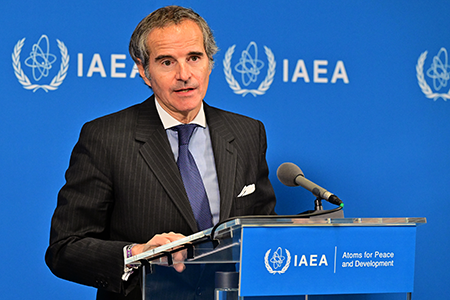"The Arms Control Association’s work is an important resource to legislators and policymakers when contemplating a new policy direction or decision."
IAEA Gains Access to Former Syrian Nuclear Sites
July/August 2025
By Lena Kroepke
The International Atomic Energy Agency (IAEA) will have unrestricted access to sites in Syria to resolve a years-long investigation into the country's nuclear program, it was announced after IAEA Director-General Rafael Mariano Grossi and Syria’s transitional President Ahmed al-Sharaa met June 4-5 in Damascus.

The agreement affects four locations, including a suspected undeclared former nuclear site in the Deir el-Zour province. The site allegedly housed a clandestine nuclear reactor that was built with the aid of North Korea; Israeli airstrikes destroyed the facility in 2007. (See ACT, April 2018.)
IAEA officials first sought access to the Deir al-Zour site in 2008 and determined that Syria was non-compliant with its nuclear Nonproliferation Treaty safeguards obligations in 2011. The regime of President Bashar al-Assad, which was then in power, denied pursuing an illicit nuclear program.
IAEA officials visited several sites in 2024, yet access was restricted after Assad’s fall in December. Grossi stated that the Syrian decision to reinstate visitations and grant full access underlines the new government’s intention to “close a chapter of Syria’s past regarding its past divergence from its non-proliferation commitments.”
Syria’s new government is increasingly cooperating with international agencies to enhance the transparent dismantling of the country’s former weapons programs.
Recent coordination with the Organisation for the Prohibition of Chemical Weapons to locate and abolish Syria’s chemical weapons stockpile has highlighted the country’s commitment to meeting international standards on the possession of weapons of mass destruction. Such cooperation has led to the recent withdrawal of long-standing sanctions by the European Union and the United States.
